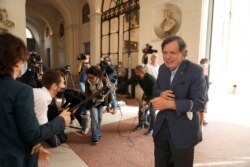Three scientists will share this year’s Nobel prize for physics for their findings about how complex physical systems operate.
The Nobel physics committee announced the winners Tuesday. They are Syukuro Manabe of Princeton University in the United States, Klaus Hasselmann of the Max Planck Institute for Meteorology in Germany and Giorgio Parisi of the Sapienza University of Italy.
“The discoveries being recognized this year demonstrate that our knowledge about the climate rests on a solid scientific foundation,” said the leader of the award’s physics committee.
Manabe and Hasselmann were honored for “the physical modeling of Earth’s climate” as well as “reliably predicting global warming,” officials said.
Parisi is honored for his early 1980s discovery of "hidden rules" behind disordered movements in physical systems from the atomic to the planet level.
The Swedish Academy of Sciences awards the Nobel Prize. It said in a statement, "Syukuro Manabe and Klaus Hasselmann laid the foundation of our knowledge of the Earth’s climate and how humanity influences it.
Giorgio Parisi won the honor for his revolutionary contributions to the theory of disordered materials and random processes," the Academy said.
All three scientists work on what are known as “complex systems,” of which climate is just one example.
Manabe and Hasselmann looked into large global forces that shape daily lives.
Starting in the 1960s, Manabe created the first climate models that predicted what would happen as carbon dioxide built up in the atmosphere. The inventive method led to more exact predictions on climate change based on carbon pollution levels.
About ten years later, Hasselmann helped explain why climate models work for weather predicting. He also developed ways to look for signs of human influence on the climate. After winning the award, Hasselmann told The Associated Press he “would rather have no global warming and no Nobel prize.’’
Co-winner Manabe called climate change a major crisis when he spoke to the AP after the announcement. Manabe said learning the physics behind the processes was “1,000 times” easier than getting the world to do something about it.
Parisi’s work involves processes within atoms.
The Academy praised his work that “built a deep physical and mathematical model” that made it possible to understand complex systems in fields like mathematics, biology, brain science and machine learning.
The Academy will present the Nobel award to the three scientists in a ceremony in Stockholm, Sweden, on December 10. Manabe and Hasselmann will share half of the 1.1 million dollars in prize money. Parisi will receive the other half.
I’m Dan Novak.
Dan Novak adapted this story for VOA Learning English based on reporting by The Associated Press and Reuters. Caty Weaver was the editor.
__________________________________________________
Words in This Story
reliable — adj. able to be trusted to do or provide what is needed : able to be relied on
global — adj. involving the entire world
foundation — n. something (such as an idea, a principle, or a fact) that provides support for something
contribution — n. something that is given to help a person, a cause, etc.
random — adj. chosen, done, etc., without a particular plan or pattern






